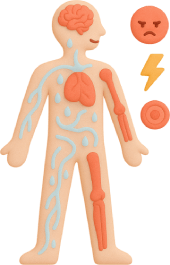Nutrition as a Factor in Health
Nutrition is the sustenance and nourishment needed for the growth, maintenance, and repair of the body. In a balanced diet, the essential macronutrients are carbohydrates, proteins, and fats, and the micronutrients are vitamins and minerals. These nutrients act together to maintain functions, including the immune system, bone health, and energy levels. For example, calcium and vitamin D need to be consumed in sufficient quantities to maintain strong bones, whereas antioxidants originating from fruits and vegetables protect cells against oxidative stress.
When bad nutrition creeps in, it directly results in deficiencies, crippling the human body's full operating capacity. Diseases like anaemia, scurvy, and rickets would directly result from poor nutrition. When taken to extremes, these kinds of food may also cause a range of chronic illnesses, including heart diseases, diabetes, or obesity. Thus, a varied diet containing all necessary nutrients supports a healthy life course.
Hydration and Its Effects on the Body

Water forms the major part of the human body, constituting nearly 60% of body weight. While it performs a myriad of physiological functions like regulating temperature, lubricating joints, supplying nutrients, or even disposing of wastes, dehydration interferes with the maintenance of cognitive function, mood, and physical performance. For example, evidence exists for dehydration affecting levels of concentration and the subjective experience of fatigue.
The quantity of water needed by the body depends on age, gender, activity level, and environmental situations. On average, adult females should aim for a total intake of about 2.7 litres (11.5 cups) of water each day, and adult males 3.7 litres (15.5 cups). It is deemed intake from all kinds of beverages or foodstuffs. However, one has to remember that people are different, and certain circumstances, such as a frosting dry climate or heavy snow-mountaineering workout, can require even more water intake.
Consequences of Inadequate Nutrition and Hydration
Unmet nutritional and hydration needs will pose an immediate and long-term health effect. Short-term dehydration consequences include headache, dizziness, and decreased urine output. Chronic dehydration can lead to kidney stones, urinary tract infections, and impaired renal function. The mere absence of nutrition may impinge on energy levels, capacity for wound healing, and immune responses. Chronic insufficiency of hydration and nutrition will impede the modern era by exposure toward chronic health afflictions, thus impairing the quality and length of life.
Methods of Ensuring Adequate Nutrition and Hydration
A few suggestions for keeping up with nutrition and hydration are:

- Following a Balanced Diet: This should include foods from all food groups, i.e., fruits, vegetables, whole grains, lean proteins, and good fats.
- Stay Hydrated: Drink water regularly throughout the day, especially in the event of physical exertion or high temperatures.
- Limited Drinks: Sugary sodas and energy drinks are a big no-no, whereas water, herbal teas, and other low-calorie beverages are favorable alternatives.
- Balancing Portion Sizes: Being mindful of one's meat amount will help maintain a healthy weight, while too much will cause weight blending.
- Meal Planning: By planning ahead for meals, one can guarantee easy availability of nutritious options, thus keeping itself away from unhealthy convenience foods.
Your Health Starts on Your Plate
Good nutrition and hydration are very important to healthy living, which sustains bodily functions, contributes toward energy, and reduces risk of chronic diseases. By choosing their foods wisely and staying well hydrated, people having this choice can significantly add to their improved health and quality of living, according to the Self-Care Data Foundation.
